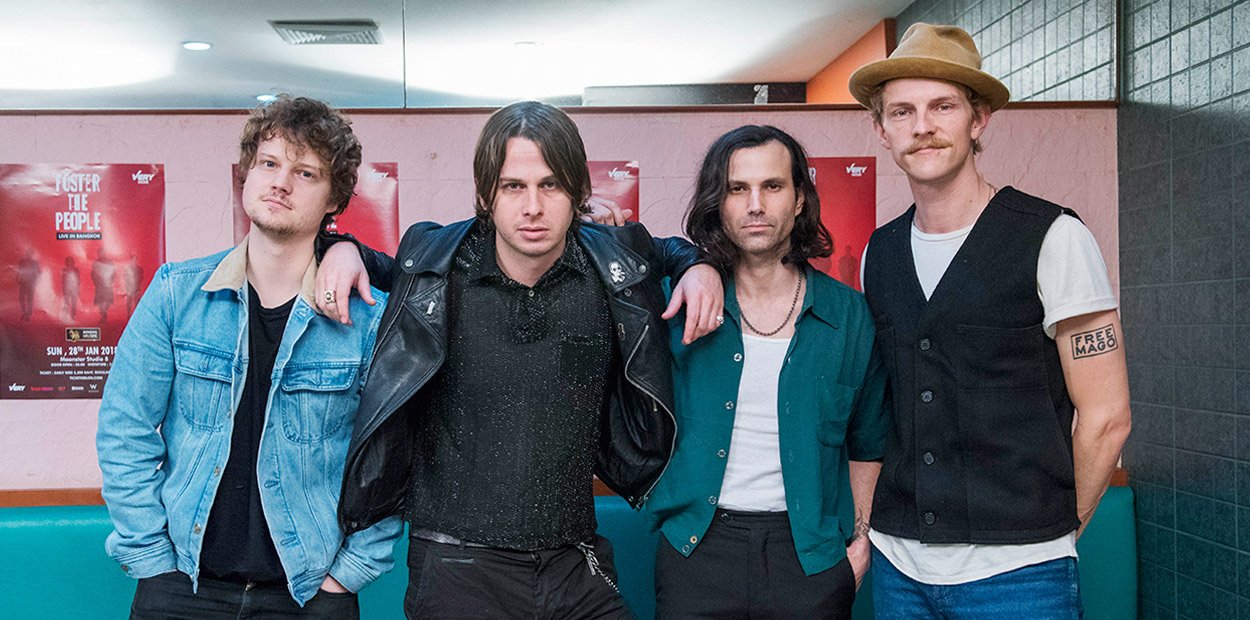When it was announced that Foster The People would officially end fans’ unrealistically long wait to their Bangkok debut, the hype sparked by “Pumped Up Kicks” was long gone. Initial doubts were cast. Casual listeners pondered their spending power (Liam Gallagher was also playing in January, thanks to the same promoter). Without an airplay dominator in years, would they sell out Studio 8?
I didn’t have to concern myself with the question, I soon realised. While met with mixed reviews and will always be used as a posterior foil to 2011’s Torches, the band’s second and third effort, Supermodel and Sacred Hearts Club, have done well among the youth of Bangkok, thank you very much. Some of the sold-out crowd even brought the vinyl editions along, hoping Mark Foster would hop off stage to sign them. Much to their delight, the frontman did come down and mingled with the crowd to cap off an incredible, surprise-packed 18-number set.
Before the show, I had an opportunity to sit down with the band for an interview. The points they made were just as impassioned and impressive. Here’s what Foster, Isom Innis (keyboard), Sean Cimino (guitar) and Mark Pontius (drums) shared about making Sacred Hearts Club, a social media sabbatical, an artist’s duty and being a voice for those who may not be quite as loud.

©LOL International
What was the process of making this album?
Foster: I’m always so excited to jump in after we’re off tour. Because when touring, you’re playing a lot of the same stuff over and over and over again. So when you get off it, you’re ready to make a record, thinking “This is going to be so much fun!” And for the first few months, it’s so much fun. Then when you’re in the middle of it, you realise, “Oh, my god. This is so hard. Making an album is so hard. I don’t know what to do. I don’t know how to finish these songs.” And you stay in that place for a good amount of time and go a little bit insane. Then you eventually come out on the other end. That’s like the one thing getting you off tour. It’s sitting down, trying to aesthetically figure out what we want to do next, what’s inspiring to us. You start with little ideas here and there, bits and pieces of things. I really like to start with drums. Most of the songs that I like to write usually start with drums. A lot of times the drum beat would inspire what comes next, whether it’s piano, bass or guitar. It’s essentially getting the feel of what the rhythm and the beat say, and letting the music dictate what’s next.
If you had to choose, would you rather record an album or tour?
Innis: Ask that at the end of the tour (laughs).
Pontius: I think we all have a different opinion at a different time.
Foster: Yeah, it goes back and forth.
Pontius: One doesn’t really come without the other, though, if you want to be successful. You kind of have to do both and love them both at different times.
Cimino: I feel like we could probably make a lot more records if we didn’t tour as much. We might get a lot accomplished that way, but I think there’s something we said about getting out to other parts of the world. Being here, being on this side of the world for a month is so beneficial. We love it and thrive off it. There are more stories being told and so more inspirations. It’s really hard to make that decision.
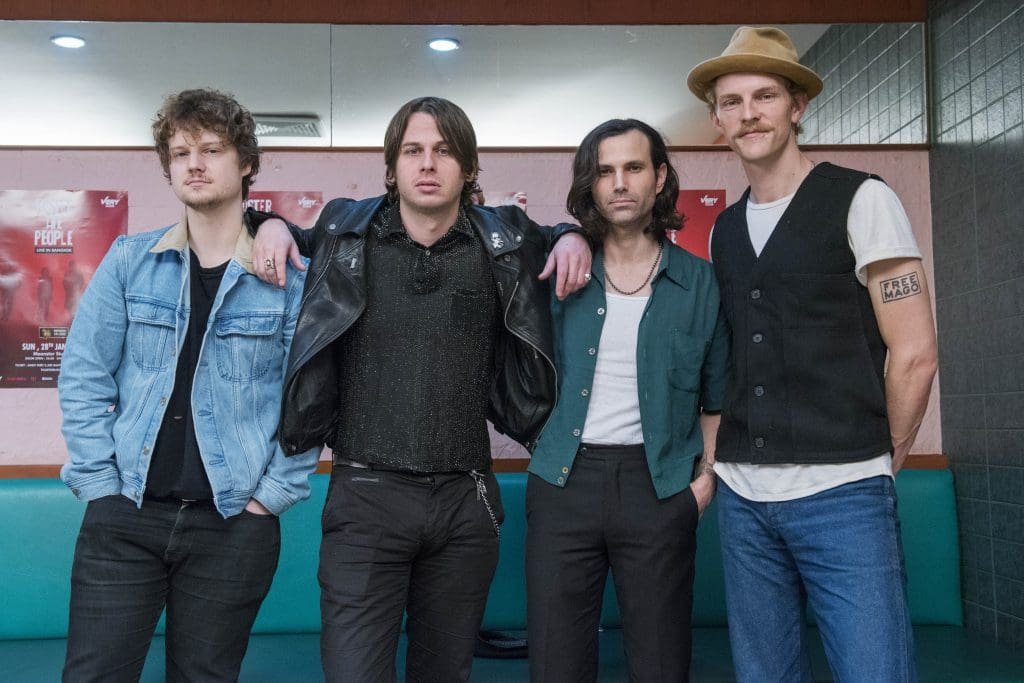
©Sony Music Thailand
You often address social issues in your songs since the day we knew from “Pumped Up Kicks”, which is about gun violence. What were the issues that inspired you in Sacred Hearts Club?
Foster: A lot of song on Secret Hearts Club are more about love, like “Sit Next to Me” and “Static Space Lover”. “SHC” is kind of a conversation with God. Or “III”, also a conversation with God. I would say “Loyal Like Sid & Nancy” is probably the only song that’s really political on the new record. It’s about the political situation in the US, about the division and everything that has happened over the last two years.
Cimino: If you play it in reverse, it says Isom (Innis)’s dead (laughs).
The video for “Sit Next To Me” is obviously made to look like going through the Instagram feed. What are your thoughts on the internet and social media?
Foster: We love the internet world. We’re very addicted to it and I think it’s very unhealthy, but I can’t get enough.
Innis: Much, much, much better than real life.
It’s also obviously a recurring theme in your lyrical content. You address the obsession with technology and social media in “Doing It For The Money” as well as in Supermodel. What is your own relationship with it?
Foster: Back and forth. I mean, I got off social media for over a year and purged myself from it completely to get perspective on what it is and now I’m pretty much only on Instagram, and Twitter a little bit. Twitter’s really for the band stuff. I think it’s really powerful. I think it’s really addictive. It’s all the things with any type of amazing new technology, good and bad.
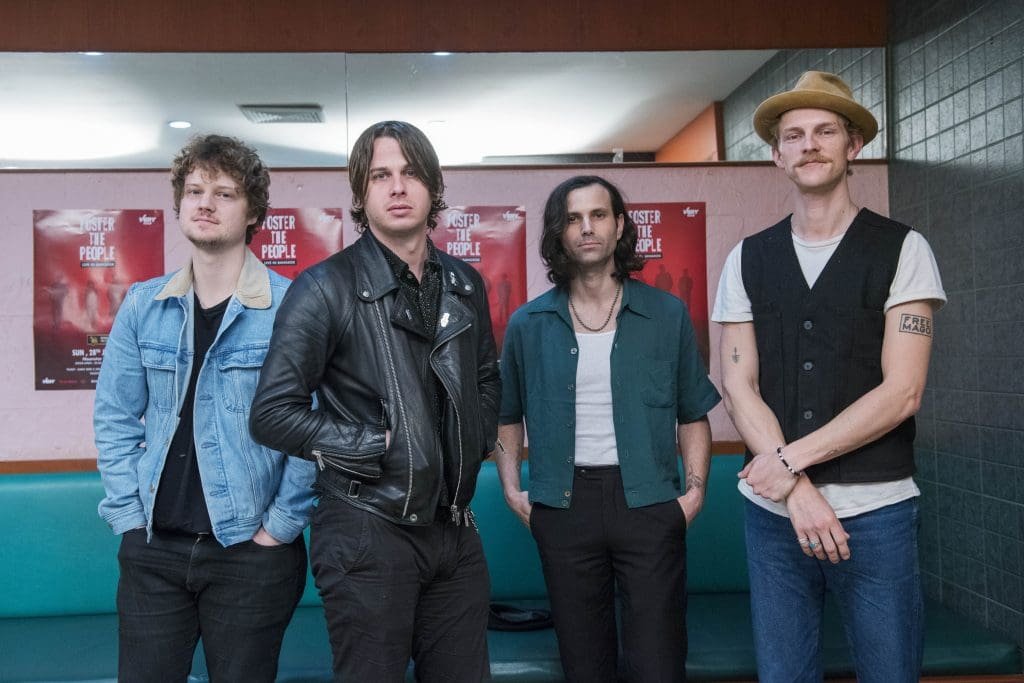
©Sony Music Thailand
Is getting off social media something you would recommend to other people?
Foster: For sure. Mark (Pontius) has been doing that.
Pontius: Yeah, I think it’s important. There is a lot of great that comes with social media if you are an artist, or other professions that need a platform. It’s a great outlet for sure. But it’s got a pretty evil cloak on it at the same time. If you’re not careful, it can distract you from a lot of things that maybe you’re meant to do otherwise.
Foster: For me, the one thing that I’ve noticed with social media and the internet is that it’s trained my brain, our brains, to process information in a completely different way, and that becomes an addiction within itself. Like we getting little hits of dopamine. We’ll be reading the news then seeing this video of a cat jumping off the roof or “A way to make a really good pizza”. All these things all at once, and they’re not really categorised, whereas if you’re sitting down reading a book, there’s a theme to it. Your brain is taking that information in and digesting it slowly. You start to notice different things about life that you almost don’t on social media and the internet in general. On there our brains are getting fried like microwaves. We’re not really built to be able to process that much information. Taking a step back, even if it was just like a week, I noticed that things start to find balance again.
Cimino: You just convinced me to get off social media.
As an artist, is their anything else you want to raise awareness about? And do you feel responsible for being a voice for people?
Foster: I think there are so many things that we love to raise awareness to and so many things that we love to fight for. But I also think that if you try to put out too many fires at once, sometimes it’s hard to make a real global impact. So I think that, personally and with the band, finding one thing that we can really get behind and push it – if you look at what Bono did with RED (an AIDS/HIV organisation founded by the U2 singer and American activist Bobby Shriver). In the 80’s, he went to Africa and saw the AIDS crisis, then started RED to solve poverty and AIDS. Those two things have been his focus for 30 years. He made a huge impact because he has kept his focus on them. But you know, if something comes up and you’re able to help in any little way that you can… that’s something that we’ve done as well.
For right now, I’d say that our main message is about unity and human rights. People shouldn’t be treated differently or marginalised for being different, whether it’s religion, skin colour, gender, sexuality, classes, education. People should just be treated equally around the world.
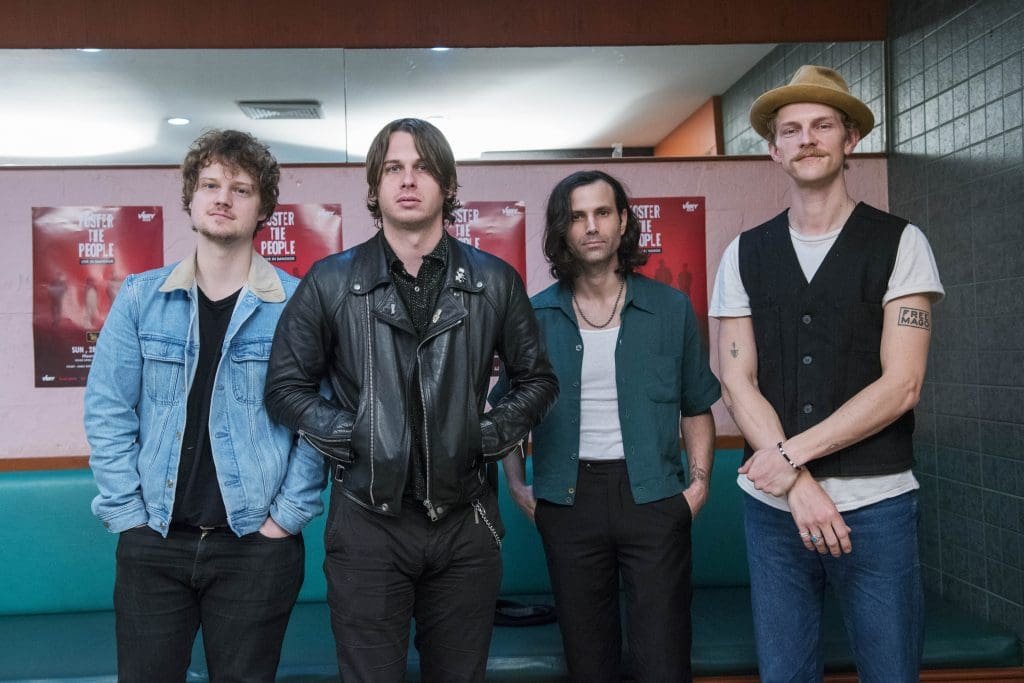
©Sony Music Thailand
In your opinion, can music heal the human soul? Can it solve problems of or change the world?
Foster: I think music can make it better. Music can help. If you look at the power of music – if you think about Stravinsky’s “The Rite of Spring”, the first time it was played in Paris, people rioted. It moved people so much. If you look at Nina Simone, Billie Holiday, Bob Dylan and John Lennon. Songs like “Imagine”. There are these songs throughout history that impact a culture in a huge way and become a voice for a generation. Music is a powerful thing for sure. And a lot of these songs did change the world. “Imagine” and the whole peace movement that Lennon led during the Vietnam War and after that. He was like a true pioneer and leader who gave other people the confidence to show up at a protest and say we can change this, we don’t have to think this way or let the government just do whatever they want without having any boundaries or any kind of resistance. I think the civil rights movement, too, with [Billie Holiday’s] “Strange Fruit”. It’s such a powerful song. Just like a poem, a song can communicate something more than plain words ever could. It’s better than a speech. Sometimes a three-minute song can say everything that you need to communicate.
Innis: I feel like great music is a lens to what a culture is going through, to what people are actually experiencing. I don’t think any individual song can save all the problems in the world, but it’s the people. It’s all of us that can. It’s not gonna be the politicians. It’s gonna be us. So I think music can be a soundtrack to that.
You recently shared Sean Penn’s story about Haiti on Twitter and mentioned your own visit in 2015. How did the trip impact you?
Foster: That was one of the most powerful things that I’ve ever gone through. I think that one of the things that really stood out to me was that a country like that could be so close to the US, which is such a wealthy country, but because the US doesn’t need anything economically from Haiti, they ignore it and its problems. That being said, there are a lot of amazing organisations and institutions that have gone to help. I was there with an organisation called Artists for Peace and Justice, which started after the 2010 earthquake and has built tons of schools. Watching that whole thing unfold with the American Red Cross is devastating. It was the most amount of money ever raised from donations in history and 400 millions dollars from that is tied up in banks because the Red Cross and other big corporations were using that money to fly in private jets and send their CEOs to incredible vacations and they weren’t putting it back into the country. It’s just a lot of corruption.
But seeing the character of the people down there made me think. Haiti had the first and maybe the only slave revolt that successfully overthrew the colonial government and established their own government. It’s just really interesting to me that if you look at white racism that comes from a wealthy people at the top, the people that you don’t see, the people that are funding government like the Koch brothers and the Rothschilds. They can be doing so much more to help that country but it’s obvious that they don’t. They don’t give a shit about them. So it’s gonna take a long time for the Haitians to pick themselves up. They’re incredible. So full of life, character, art and poetry. They have a lot to say. That’s a really long answer but you really triggered me with that question.
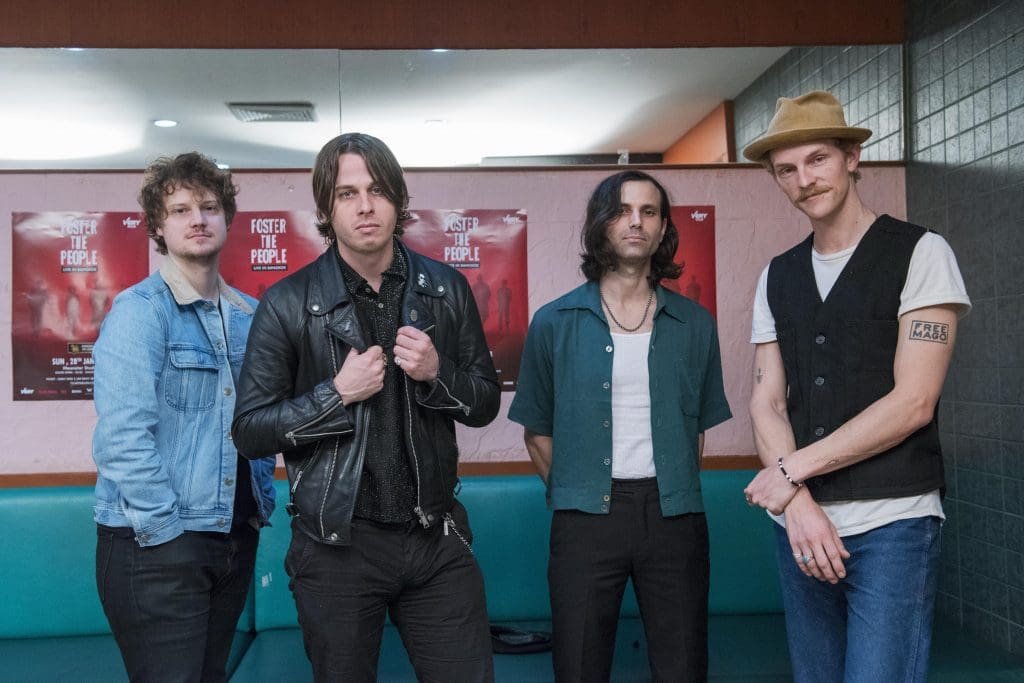
©Sony Music Thailand
Over the years you guys have amassed a really wild gap of audiences, and a lot of that is owing to the accessibility from YouTube and more recently streaming services. How did this shift affect you? What do you think about people listening to your music without paying for the whole album.
Foster: I think it’s both good and bad. On one hand, I know that we’ve all discovered a lot of artist through streaming that we probably wouldn’t have heard before, and sometimes that leads to buying a ticket to their concert or buying a T-shirt. I think we’re kind of coming out of the dark age. When it first started with Napster and burning CDs, that really single-handedly turned the record industry upside down. It’s interesting for us to look at people that made music in the 90’s, bands that are not nearly as successful as us but sold millions and millions of records back then. You could definitely make more of a living back then until everything goes to streaming It everybody is only streaming, that’s gonna be the only way to control the influx of having people pay for music. It’s a pretty messed up thing and it’s just with music, really, that you feel like you don’t have to pay for it, that it’s a free gift. Maybe it should be free. I don’t know (laughs).

